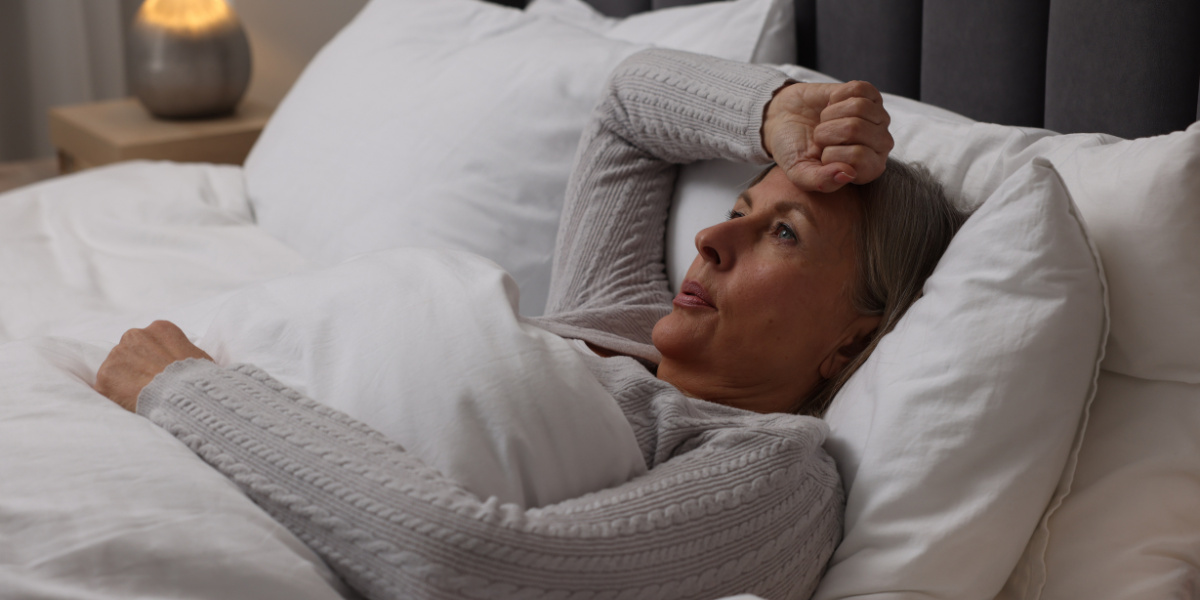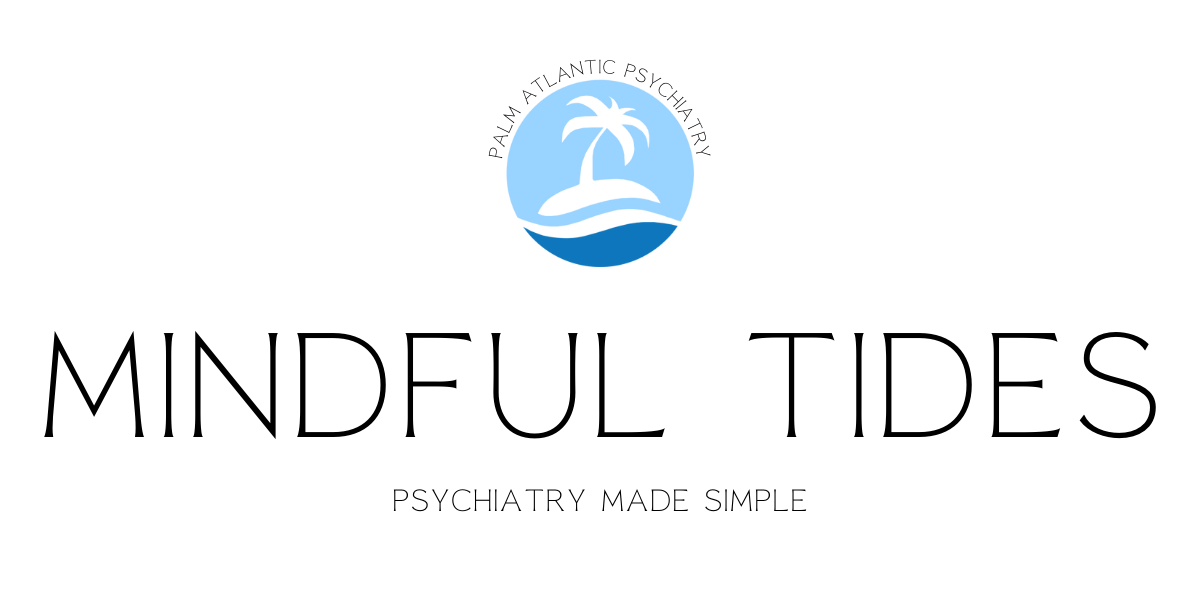Sleep and Mental Wellness in Menopause: Managing Sleep Disruptions for a Healthier Mind

For many women, menopause brings on sleep disturbances that can impact mental wellness. Hot flashes, night sweats, and hormonal shifts can lead to fragmented sleep, resulting in irritability, fatigue, and even increased anxiety or depression. Addressing sleep disruptions during menopause is essential for mental clarity, emotional stability, and overall quality of life.
In this article, we’ll discuss why menopause affects sleep, explore strategies for better rest, and explain how improved sleep can enhance mental wellness.
Why Does Menopause Disrupt Sleep?
Sleep disruptions during menopause are often caused by declining estrogen and progesterone levels. These hormonal shifts can make it difficult to fall asleep, stay asleep, or achieve deep, restorative rest. Common symptoms like night sweats and hot flashes can further contribute to sleep fragmentation, leaving many women feeling unrested.
Common Sleep-Related Symptoms of Menopause:
- Difficulty Falling Asleep: Restlessness or racing thoughts can make it hard to settle into sleep.
- Frequent Awakenings: Night sweats and hot flashes may cause frequent wake-ups, disrupting sleep cycles.
- Fatigue and Daytime Sleepiness: Poor sleep can lead to low energy, irritability, and difficulty concentrating during the day.
Understanding how menopause impacts sleep can help you find effective ways to improve sleep quality and maintain mental wellness.
Strategies for Managing Sleep Disruptions During Menopause
Here are some practical tips to help manage sleep disturbances and improve sleep quality:
1. Create a Relaxing Bedtime Routine
Establishing a calming pre-sleep routine helps signal to your brain that it’s time to wind down, making it easier to fall asleep.
Bedtime Routine Tips:
- Spend 30 minutes before bed engaging in relaxing activities like reading, journaling, or stretching.
- Avoid screens and bright lights, as they can interfere with melatonin production and disrupt sleep.
- Practice deep breathing exercises or progressive muscle relaxation to calm the mind and body.
2. Keep Your Sleep Environment Cool and Comfortable
Menopause-related hot flashes and night sweats can disrupt sleep, but creating a cool and comfortable bedroom environment can help reduce their impact.
Tips for a Cooler Sleep Environment:
- Set your thermostat to a cool temperature, ideally between 60-67°F, to promote restful sleep.
- Use breathable, moisture-wicking bedding and sleepwear to help regulate body temperature.
- Consider using a fan or investing in a cooling mattress topper to improve comfort.
3. Prioritize Consistent Sleep Schedules
Consistency is key to maintaining good sleep hygiene. Going to bed and waking up at the same time each day helps regulate your body’s internal clock, promoting better sleep quality.
How to Maintain a Consistent Schedule:
- Try to go to bed and wake up at the same times, even on weekends, to stabilize your circadian rhythm.
- Limit daytime naps to 20–30 minutes if you feel tired, as longer naps may interfere with nighttime sleep.
- If you can’t fall asleep after 20 minutes, get out of bed and do a calming activity until you feel drowsy, rather than forcing yourself to sleep.
4. Incorporate Physical Activity and Relaxation Techniques
Exercise has been shown to improve sleep quality, as well as reduce stress and anxiety. Additionally, relaxation techniques can help you feel more centered and reduce racing thoughts at bedtime.
Exercise and Relaxation Tips:
- Aim for at least 20–30 minutes of moderate exercise each day, such as walking, yoga, or swimming.
- Avoid vigorous exercise close to bedtime, as it can increase alertness and make it harder to fall asleep.
- Try relaxation techniques like meditation, deep breathing, or progressive muscle relaxation to ease stress and promote restful sleep.
5. Limit Caffeine and Alcohol Intake
Caffeine and alcohol can disrupt sleep quality, especially when consumed close to bedtime. Limiting or avoiding these substances may help improve sleep during menopause.
Guidelines for Caffeine and Alcohol:
- Limit caffeine intake to the morning hours, avoiding it after lunchtime to prevent interference with sleep.
- Minimize alcohol intake in the evening, as it can disrupt sleep cycles and lead to wakefulness during the night.
- Opt for calming herbal teas, such as chamomile or peppermint, which can be soothing without the stimulating effects of caffeine.
How Improved Sleep Supports Mental Wellness
Better sleep quality has a profound impact on mental wellness. Restorative sleep supports cognitive function, emotional regulation, and resilience, helping you navigate the challenges of menopause with greater clarity and confidence.
Mental Health Benefits of Quality Sleep:
- Enhanced Mood: Good sleep supports emotional stability, reducing irritability and helping to alleviate anxiety and depression.
- Improved Focus and Memory: Restful sleep enhances cognitive function, making it easier to focus, recall information, and make decisions.
- Greater Stress Resilience: Quality sleep improves stress management, helping you cope with daily challenges and maintain mental clarity.
How Palm Atlantic Psychiatry Can Help
If sleep disruptions during menopause are affecting your mental wellness, Palm Atlantic Psychiatry offers personalized support to help you achieve restful sleep and maintain emotional stability. Our team provides medication management and holistic treatment plans that address sleep issues, mood swings, and cognitive concerns related to menopause.
For those interested in natural options, Palm Atlantic also provides
Thorne supplements that promote relaxation, reduce stress, and support sleep quality, creating a balanced approach to managing menopausal symptoms.
With telepsychiatry available across Florida and in-person care at our Jupiter, FL location, Palm Atlantic Psychiatry offers convenient, accessible support to help you manage menopause-related sleep challenges and prioritize mental wellness.
Final Thoughts
Sleep disruptions are a common but manageable part of menopause. By creating a calming sleep routine, maintaining a cool sleep environment, and prioritizing lifestyle choices that support sleep, you can improve rest and mental clarity during this transition.
If menopause-related sleep disruptions are impacting your quality of life,
consider reaching out to Palm Atlantic Psychiatry. Our team provides compassionate, comprehensive care to help you navigate menopause with resilience and peace of mind.






